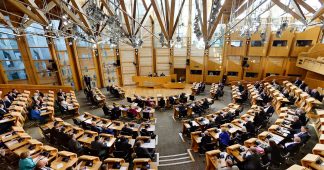PCS is calling for the STUC to facilitate a union-led ‘constitutional convention’ to represent the voices, views and vision of working people across Scotland for our future. LYNN HENDERSON explains
By Lynn Henderson
T’S two months on, Boris Johnson is in power, the Withdrawal Agreement Bill has passed and the battle to replace Jeremy Corbyn as Labour leader is turning toxic.
For the past couple of years under Corbyn’s leadership, there was real hope for an alternative socialist government that even in Scotland united many on the pro-independence left with those who travel on a different road to socialism.
When the exit polls came out at 10pm on December 12, I was in BBC Radio Scotland’s Glasgow studio with former Scottish republican turned Tory MSP Adam Tomkins and the SNP’s Shirley Anne Somerville.
We were, to a person, astonished at the strength of the Tory majority for the UK parliamentary elections that was about to roll out through the night.
However, that’s where the studio unity ended. While Tomkins smirked gleefully, noting the strength of working-class support in northern England moving behind the Tories, Somerville, smiling, confidently claimed the potential of a raft of new MPs as a good night for Scotland and the SNP.
For my part, all I could say was that it certainly wasn’t a good night for Scotland nor a good night for working-class people in any of the nations of the UK.
To equate an emboldened right-wing Johnson government sweeping the seats at Westminster as a good night for Scotland is an act of self-flagellation. But I am socialist, not a nationalist.
Under Corbyn’s leadership, the Labour Party has grown to become the biggest political party in Europe.
The manifesto and the programme was progressive and socialist. Unfortunately we lost it on Brexit.
And Labour in Scotland has failed to break through the SNP social democratic stranglehold on the electorate. Too many mixed messages do not regain trust.
While flag-wavers waved flags, real thinkers in the Scottish indy left supported Corbyn too, over what they regard as the bourgeois nationalism of the SNP.
Now looking down the telescope of at least five more years of Tory rule, it is understandable that the Scottish labour movement is debating alternatives again. Let this be a real debate and not just a tug-o-war.
It is significant then that Unison’s Scottish council this month voted overwhelmingly to support the call for a second independence referendum, at a time to be determined by the Scottish Parliament.
The debate in the wider trade union movement is building towards the STUC congress in April. PCS, the Civil Service union, will lead the debate on the Scottish Parliament’s right to hold a second independence referendum.
In the run-up to September 2014, PCS took a leading stance in deeply engaging our membership on the processes and issues in the independence referendum.
We took the view that the workers across current UK and Scottish public services delivered in Scotland had a right to a say as workers on the biggest political issue of our age and one that would have a massive industrial impact on the work they do and who their employer is.
However, in 2020 the debate is different. At this stage the issue is on the right to hold a referendum.
Johnson and Nicola Sturgeon remain at loggerheads over the section 30 order. The SNP as a party is not clear whether it wants a referendum this year or next. Scottish Labour is even less clear about where it stands on the issue.
This question of democracy transcends party affiliation, left and right. It is a simple question of right or wrong.
There is majority support for independence in the Scottish Parliament. The return of only one Labour MP in Scotland against the SNP’s 47 does suggest that there is a surge in support for independence.
Polling has tipped over to just over half of the people of Scotland now supporting independence.
We must separate the support for the right to hold a referendum from the SNP’s neoliberal vision of an independent Scotland catalogued in the Growth Commission’s report.
That is a debate in itself, and one that we will take up with a flourish as a movement.
Here is something innovative. PCS is calling for the STUC to set up an alternative to the SNP’s Citizens’ Assemblies model, in order to facilitate a union-led “constitutional convention” with affiliates to represent the voices, views and vision of working people across Scotland for our future, which is neither Growth Commission nationalism nor Tory status quo.
This is about meaningfully engaging workers in the debate and not just treating them as passive recipients.
The right to self-determination for Scotland is an important principle steeped in the historic role that the Scottish trade union movement has played.
From the workers’ parliament to the Campaign for a Scottish Assembly and in the formation of the Constitutional Convention, the STUC has played a leading role in influencing civic society.
The new general secretary, Roz Foyer, who is taking up post next month, is extremely well placed to ensure that the STUC and affiliates once again lead and influence the debate on Scotland’s future in the interests of workers and the communities in which we live and work.
The general council must be proactive in ensuring this right to self-determination is upheld, including the holding of a referendum on independence, with or without the consent of the UK government.
The Scottish Morning Star conference on March 29 will debate these issues. The Jimmy Reid Foundation is organising a major fringe at STUC congress, and exploration of democracy and trade unions remains a central tenet of the trade union group Politics for the Many.
When I woke up on the morning of Friday December 13, it was the driving need to organise workers to realise their own power that got me out of bed. This remains the case two months on.
* Lynn Henderson is PCS union head of industrial strategy and was STUC president 2018-19.
Published at https://morningstaronline.co.uk/article/f/labour-movement-must-take-lead-scottish-independence-debate











